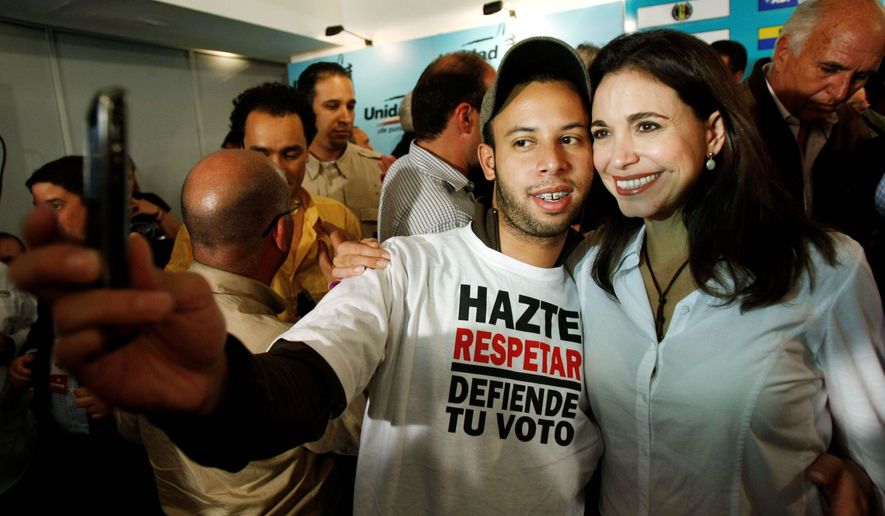Venezuelan opponents of President Hugo Chavez cheered Sunday’s election results, in which a newly unified opposition gained a significant bloc of seats in the country’s National Assembly and apparently a majority of the popular vote.
Election officials in Caracas confirmed Monday that the weekend returns had cost the populist Mr. Chavez the two-thirds majority in the legislature that allowed him to govern virtually unhindered for the past five years. His party had won the supermajority after the opposition boycotted the 2005 elections.
“Yesterday was a turning point in Venezuelan history,” victorious opposition candidate Maria Corina Machado said in an interview Monday. “A new phase begins today, and we’ve taken a big step toward the day when democratic values, freedom, justice and good governance prevail.”
Ms. Machado, a longtime opposition leader often touted as a potential Chavez challenger, said she believed the president “made a big mistake by turning the election into a plebiscite on himself.”
“He did that and he lost,” she said. “This is a clear signal that Venezuelans do not want an authoritarian government, a militarized government, a centralized government and a government that wants to turn Venezuela into Cuba.”
Falling short of the two-thirds majority means Mr. Chavez no longer has the power to pass laws by decree, appoint members to other branches of government or take other steps without any input from the National Assembly.
“There’s no question that this is a victory for Venezuela’s opposition,” said Adam Isacson, senior associate at the Washington Office on Latin America. “They did about as well as the polls were projecting, but many assumed that electoral machinations would have given [Mr. Chavez’s party] a few points’ more advantage.”
The country’s National Electoral Council reported Monday that, of the 165 seats up for grabs, Mr. Chavez’s United Socialist Party, known by its Spanish acronym PSUV, had claimed at least 96. But the opposition Coalition for Democratic Unity had won at least 61 seats, easily surpassing the one-third mark.
While the electoral council has not yet announced nationwide popular vote totals, opposition leaders — echoing exit polls and media reports — claimed that they had won 52 percent of the vote. The structure of the Venezuelan electoral system, and changes made to it by a Chavez-backed 2009 law, had essentially ensured that a majority of votes would not translate into a majority of seats for the opposition.
Mr. Chavez tried putting a best face on the results on his Twitter account. “Well, my beloved countrymen, it’s been a great day and we have won a solid victory,” he tweeted. “Enough to continue strengthening Bolivarian and Democratic Socialism.”
Mr. Chavez has seen his approval ratings tumble lately, with Venezuela’s petroleum-centered economy still suffering the effects of the 2008 crash in oil prices induced by the global economic downturn. The economy shrank by 3.3 percent last year, while inflation has soared above 30 percent, making groceries and other basic necessities increasingly hard to come by for many Venezuelans. The opposition has also hammered the government for widespread corruption and soaring street crime.
WOLA’s Mr. Isacson said that the opposition’s apparent popular-vote win was notable “in the face of the government spending massively on giveaways, ads and public works during the campaign season — and also in the face of their own historical fractiousness.”
He said opposition groups coordinated to run just one candidate in each district, avoiding the vote-splitting that had damaged their campaign against Mr. Chavez in previous elections.
He cautioned that the existing National Assembly, dominated by Chavez supporters, still has a lame-duck session “in which all manner of hard-line measures could be passed — perhaps even including measures to strip the legislature of some of its power.”
But he added that “the opposition now has a platform and a mouthpiece that it didn’t have before. If it uses them wisely and in a united fashion, it will be well-positioned for the 2012 elections.”
Mr. Chavez, a one-time military officer who was elected in 1998 and is expected to seek another term in 2012, has recovered from previous setbacks: his failed 1992 coup attempt, which landed him prison; the 2002 coup that briefly removed him from power; and his 2007 constitutional referendum that voters narrowly rejected.
But Inter-American Dialogue President Michael Shifter said that Sunday could prove to be the beginning of the end for the outspokenly anti-U.S. Mr. Chavez.
“Despite his emotional bond with many Venezuelans, and the extent of his institutional control and manipulations, the deterioration in the country’s security and economic situation has just been too great, and it has hit Chavez’s main constituency — the very poor — the hardest,” Mr. Shifter said, adding that the “opposition now faces two critical tasks” — to “develop serious policy ideas to address a range of problems” and to “come up with an appealing leader who can effectively communicate a vision for a post-Chavez Venezuela that can appeal to enough Chavez supporters.”
He mentioned Ms. Machado, Caracas Mayor Antonio Ledezma and former Chacao Municipality Mayor Leopoldo Lopez as three potentially strong contenders.
He speculated that Mr. Chavez might try to divert attention abroad, igniting crises with America and with neighboring Colombia, but said that it was unlikely to work as well as it had in the past.
“Venezuelans have grown weary of these tirades,” Mr. Shifter said. “And Chavez has lost his two favorite foils — [President George W.] Bush and [former Colombian President Alvaro] Uribe.”
President Obama and new Colombian President Juan Manuel Santos, he said, “are far more pragmatic and will not play into Chavez’s hands and fall for his trademark provocations.”
• Ben Birnbaum can be reached at 138247@example.com.




Please read our comment policy before commenting.